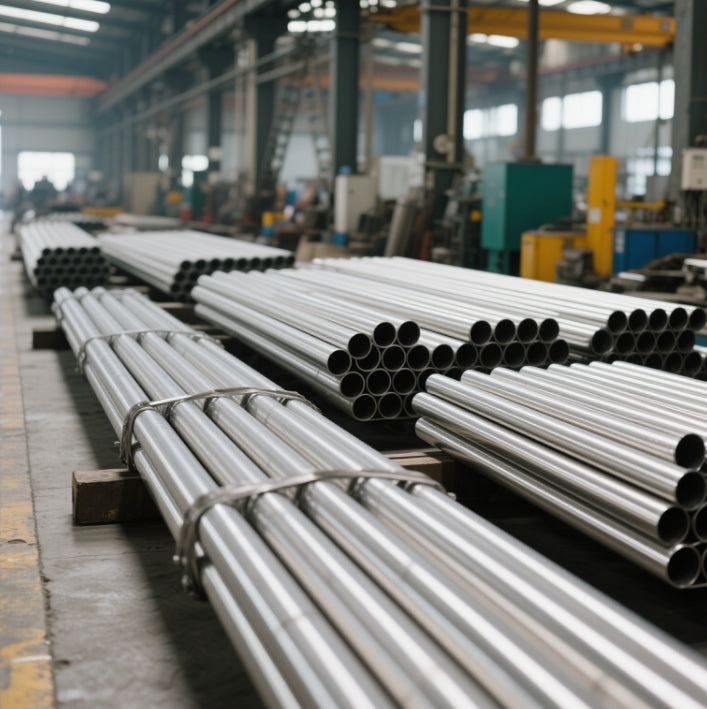StockSteel
Stainless Steel Pipe | 316L Fire-Rated Exhaust Systems
Stainless Steel Pipe | 316L Fire-Rated Exhaust Systems
Couldn't load pickup availability
Stainless Steel Pipe | 316L Fire-Rated Exhaust Systems
Product Specifications
Material Grade: 316L (UNS S31603)
Standards: ASTM A312, ASME SA312, EN 10217-7
Certifications: ISO 9001, PED 2014/68/EU, TÜV
| Property | Value |
|---|---|
| Outer Diameter (OD) | 12.7 mm – 610 mm (including 8 stainless steel stove pipe at 219.1 mm) |
| Wall Thickness | 1.5 mm – 12.7 mm (adjustable for schedule 40s stainless steel pipe) |
| Hardness (Rockwell B) | ≤95 HRB |
| Hardness (Vickers) | ≤220 HV |
| Surface Finish | Pickled, Annealed, Electropolished |
| Tolerance | OD ±0.1%, WT ±10% |
| Schedule Options | SCH 5S–160 (SCH 40S standard for high-pressure systems) |
Technical Attributes
Tensile & Bend Strength
316L stainless steel exhibits tensile strength ≥485 MPa and yield strength ≥170 MPa, making it ideal for fire-rated exhaust systems exposed to cyclic thermal stress. Its elongation (≥40%) allows seamless bending into complex duct layouts without cracking. For pipe stainless steel 316 applications, this grade maintains stability at temperatures up to 870°C, resisting deformation in industrial furnaces and high-heat environments.
Weight Calculation Formula
Weight per meter (kg/m) = (OD – Wall Thickness) × Wall Thickness × 0.0248
Example: An 8 stainless steel stove pipe (OD 219.1 mm, thickness 6.35 mm):
Weight = (219.1 – 6.35) × 6.35 × 0.0248 ≈ 32.1 kg/m.
Identification Marking
All pipes are laser-etched with:
- ASTM/ASME standard (e.g., ASTM A312).
- Grade (316L), OD, thickness, heat number, and manufacturer’s logo.
- Traceability codes compliant with EN 10204 3.1 standards.
Why Does Stainless Steel Rust?
Despite 316L’s superior corrosion resistance, rust can occur under extreme conditions:
- Chloride exposure: Prolonged contact with saltwater (>500 ppm chloride) degrades the passive chromium oxide layer.
- Mechanical damage: Scratches from improper handling or abrasive cutting tools expose unprotected metal to oxidation.
- Galvanic corrosion: Direct contact with carbon steel in humid environments accelerates rust formation.
Manufacturing & Customization
Processes:
- Cold drawing: Enhances dimensional precision for schedule 40s stainless steel pipe applications.
- TIG welding: Seamless joints for high-pressure exhaust systems.
- Solution annealing: Heated to 1,040–1,100°C to eliminate carbide precipitation during welding.
Custom Options:
- Fire-rated insulation: Ceramic fiber wrapping for 8 stainless steel stove pipe systems exceeding 800°C.
- Threading: NPT/BSPT threads for modular exhaust assemblies.
Applications
- Industrial exhausts: High-temperature pipe stainless steel 316 for chemical plants and refineries.
- Commercial kitchens: Corrosion-resistant 8 stainless steel stove pipe for grease-laden fumes.
- Power generation: SCH 40S pipes for turbine exhaust gas management.
Why Choose Our 316L Stainless Steel Pipes?
- Material Integrity: Full traceability with EN 10204 3.1 Mill Test Certificates and third-party SGS/BV inspections.
- Custom Solutions: Tailored schedule 40s stainless steel pipe and fire-rated variants for ASTM/ASME compliance.
- Global Inventory: 5,000+ tons of ready stock, including 8 stainless steel stove pipe and SCH 40S schedules.
- Technical Support: 24/7 engineering guidance on welding, cutting, and corrosion prevention.
- Sustainability: 100% recyclable material with ISO 14001-certified production.

